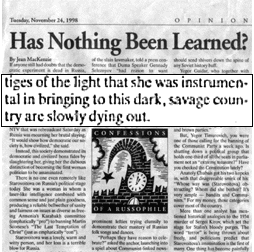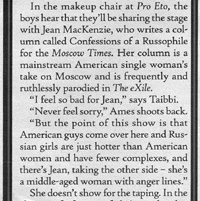
Issue #28/53, December 3 - 16, 1998 

 |
| Jean Unplugged |
| "Bla-X-ploitation" page |
 |
 |
It didn't take Jean MacKenzie long to fuck up her entree into the world of big-time print journalism, which until now had been the only successful coming-out party the Moscow Times's thunder-thighed curmudgeon-columnist had ever had. Just weeks into her stint as a stringer for the Boston Globe, MacKenzie reached into the proverbial cookie jar in a piece about Alfa-Bank, plugging her own newspaper in the article without identifying herself as its employee.
Not that there weren't other, more important things wrong with the piece-there were. For one thing, it was a shameful bit of cheerleading for
| Big Brother's Big Sister. MacKenzie practices Orwellian double-speak by calling Russia "this dark, savage country" in last week's "Confessions of a Russophile [sic] |
 |
MOSCOW - Alfa Bank is not yet giving away free toasters with each new account, but managers have thought of almost everything else to drum up business.
"Having trouble with payments? Accounts frozen? Paying employees in cash? Call Alfa Bank!" screams a full-page ad in The Moscow Times, an influential English-language daily. The bank has even begun a television campaign in an all-out effort to bring new customers--and a bit of cash--to its doors.
We at the eXile don't know much, but we do know one thing: if an article appeared in the Boston Globe (or any other mass-market publication) which said that some Russian bank was hoping to drum up business by taking out full-page ads in the "influential" eXile, we sure as hell would use that as a selling point. We'd photocopy the article and pass it out as an addendum to our usual brochure during our sales pitch to potential advertisers. Hey, you take p.r. where you can get it. And we'd take that. This week, I called up Mike White, Senior Editor for the Columbia Journalism Review, and asked him the following question: in general, is it ethical for a free-lancer to plug his own company in a news article without identifying himself as an employee?
"Well," White said, "when you're describing your employer, the reader ought
 |
| Jean as she appears to American readers of Rolling Stone, issue #800 |
There you go. It's worth mentioning though, that though what Jean did was unethical in a pointless and stupid sort of way, it wasn't that big a deal, in the grand scheme of things. And though we would have pointed it out anyway, out of spite, we probably wouldn't have given it as much space as we are here, had a maggot on the Boston Globe foreign desk not given us a hard time about it when we called.
You remember that line from Full Metal Jacket, about how "only faggots and sailors are called Lawrence"? Well, you can add "Snively assistants to Foreign Editors" to that list; the guy we got on the phone was one Lawrence Redford, assistant to Globe Foreign Editor Sam Allis. When I called and asked if the Globe had been aware that MacKenzie was an employee of the Moscow Times, Redford first said "that specific issue has been discussed".
Then he cupped the phone while he chased down Allis, and then came back to say that no, the editors had not been aware of that, but now that that they were, Mackenzie's piece was "not viewed as unethical".
"It's not a problem, and I don't see how it could be viewed as one," he said. Then he asked why I was asking. When I told him that I was writing a press review piece, and that I wanted the Globe's comment, he said, "Well, you certainly can't quote me on this, since I never indicated that I wanted anything I said to be for attribution."
"No, you're wrong," I said. "I identified myself as a journalist at the beginning of this call. If you don't want to be quoted, you've got to say so right away."
Redford snorted. "And you call Jean a bad journalist," he said. It's really amazing how stupid press people can be when they're put on the record. "Listen, man, you know the rules," I said. "If you want to talk off the record, you've got to say so at the beginning of the conversation. You can't just run your mouth and then change your mind."
Redford snorted again. "You're a piece of work," he said.
Well, Lawrence, you may be right. But at least I'm not out there in print this week smugly announcing to my boss that I don't know the rules of attribution. That would be you, big guy.
As for Jean, White put it best. "What she did wasn't a really terrible thing," he said. "But she should have done it another way."
| To 500,000 readers of this article, Jean MacKenzie's name will be remembered alongside mean old comic foils like Mrs. Crabtree |
